- Home
- Diana Lopez
Lucky Luna Page 5
Lucky Luna Read online
Page 5
“Previously owned,” Claudia corrects. “Maybe it’s not brand-new, but it’s new to my family.”
I don’t comment, even though I want to. Instead, I ask to see the cabin, and she points to a little door at the front of the boat. I open it and peer inside.
“This isn’t a cabin,” I say. “It’s a cubbyhole. I thought you had a little kitchen and a place to sleep. You don’t even have windows in here.”
She rolls her eyes. “Whatever. You can go inside if you want.”
I step into the dark creepy space. There are cushions on a bench that opens up for storage and a square plastic thing with a lid.
I grab my nose and pinch it. “Is that a toilet?”
“Yes,” she says as if it’s obvious.
“Does it flush?”
“No. It’s a portable toilet. You have to empty it when you get back to land.”
“That’s gross!” I say.
“Not as gross as peeing in your pants.”
She looks at me, and I look at her. Then we start laughing. We can’t stop. For some reason, the portable toilet is the funniest thing in the world, especially when I imagine trying to pee in a rocking boat. Soon, we’re holding our stomachs because we’re laughing so hard.
We finally settle down, and I climb out of the cabin. “We should be explorers,” I say, and she agrees. She even lets me play the part of Amerigo Vespucci while she plays Magellan, who was famous but not enough to have a whole continent named after him. Then we act out Peter Pan, and I get to be Captain Hook. After that, we switch to Pirates of the Caribbean. I play the hero, Jack Sparrow, and Claudia plays the villain, Davy Jones. He looks like an octopus with a bunch of tentacles on his face. The tentacles look like giant noses. I think this, but I don’t say it.
“Let’s be swashbucklers,” Claudia says.
We grab sticks from the yard and pretend to swordfight. Our sticks clack against each other. We jump off the boat and climb back on, the whole time pretending to stab at each other and saying things like “You barnacle-faced fool!” and “You crusty landlubber!” Then I swipe at Claudia’s “sword.” She drops it and throws herself on the deck. I pretend to stab her chest. She grabs her heart and moans. Then she makes a big show of dying. She even kicks up her legs a few times and I almost forget how annoying she can be.
Claudia and I had fun on the boat, but it was a one-time thing because the rest of the week goes by and, every day, she gets on my nerves. She gets a perfect score on the spelling test, but I miss three words. She says, “I’m making higher grades than you.” Then she finds my dodecahedron and tells me that everyone else’s is perfect and symmetrical while mine is shaped like a pear. I try to explain that Earth is pear-shaped, too, but she just shakes her head.
During lunch, she sits at my table and makes fun of how I eat. “Salad dressing is for salads,” she says, “not green beans.” And “You’re supposed to eat dessert last, not first.”
Then she tattles to my parents. “Luna was talking in the library,” she tells my mom. “Luna was passing notes during class,” she tells my dad.
And she tattles to my teacher. “Luna doesn’t have a rabbit, so there’s no way a rabbit ate her homework” and “Luna didn’t have emergency surgery on her pancreas so she had plenty of time to study.”
I’m going to run out of excuses if she keeps tattling! This has got to be the most stressful semana of my life! I don’t care how much fun I had on Claudia’s boat.
Finally, it’s Friday, which is a good-luck and a bad-luck day. Good, because of the weekend. Bad, because Mr. Cruz wants us to write Spanish skits today.
Spanish is my worst subject. I got an F on our first test last week. It was supposed to be a review of Spanish words we learned during fourth grade last year, but since I didn’t practice over the summer, I failed. When Claudia found out, she bragged about being an A student.
I couldn’t stand how high-and-mighty she was, so I said, “I could make straight A’s if I wanted, but I like all the letters of the alphabet. I don’t want the B’s, C’s, and F’s to be left out. I feel sorry for them, so don’t blame me for giving the other letters a chance to be on my tests. Some people believe in equal opportunity.”
Claudia got the message. She might make straight A’s, but I was a nicer person. And because she was jealous about how nice I am, she ran to my mom after school and said, “Did you know Luna failed a Spanish test on purpose?”
I wish my last name were Smith or Parker or Woo. No one expects a Smith or Parker or Woo to know Spanish. But my last name is Ramos. It’s a very common name in Spain and Mexico, so lots of people with this name speak Spanish. In fact, my dad and abuela and half (but not all) of my cousins speak it. They think I can speak it, too, even though no one has ever taught me since my mom doesn’t speak it, only my dad.
For our Spanish skits, Mr. Cruz hands out puppets and asks us to use vocabulary from our lessons. Puppets are kind of babyish, but we don’t care. Anything’s better than worksheets.
Mr. Cruz gives me a dog puppet. It’s got floppy ears and a tongue that hangs out its mouth. Once we get our puppets, Mr. Cruz tells us to form groups. I join Mabel and John-John. He has the doctor puppet and she has the wizard.
I already have a great idea for our skit, but before I can share it, Claudia comes over. She’s got the king puppet.
“Go find your own group,” I tell her. “We already have our idea and it doesn’t need a king,” and to Mabel and John-John, I say, “Right?”
John-John looks away, not wanting to answer. Mabel says, “I don’t know what our idea is yet, but I’m sure we can work in a king.”
“We can’t,” I insist, giving her a stern look.
Claudia doesn’t give up. “You got an F on your test, remember? You should let me help since I’m bilingual.”
“We don’t need your help,” I say.
“Are you sure? I’m trying to be nice.”
Is she crazy? She is everything but nice. “No, you’re not,” I say. “You’re just showing off again because you think you’re better than me.”
“I am better than you, especially when it comes to Spanish.”
If I were a rattlesnake, I’d strike her with my venomous fangs, but I’m not, so I just glare at her instead.
She shrugs it off. “Don’t blame me when you get another F,” she says, walking away and joining a group that has a chef and a ballerina.
When I turn back to my group, Mabel and John-John look stunned.
“If she knows Spanish,” Mabel says, “we should let her help us.”
“Yeah,” adds John-John. “You know our Spanish is a big problemo.”
It’s true. John-John doesn’t know any Spanish and that “problemo” really ends with an A. His family came to the US from Ireland and even though they say “wee” instead of “small,” it’s still English. Mabel doesn’t know Spanish, either. Her family is from the Philippines, and she says they speak Tagalog. Poor Mabel. She needs her dad to translate when she talks to her lola. At least, I can talk to my abuela without a translator—sort of.
Mabel thinks I’m lucky because I know a little bit of Spanish, which is better than knowing none at all. But I think I’m unlucky because knowing a little bit makes people think you know a lot. Plus, the Philippine islands are thousands of miles away, and it takes a whole day to get there, even on the fastest airplane. But Mexico is only three hours away, even in the slowest car. A bunch of signs in Corpus Christi are written in English and Spanish, but you never see signs in English and Tagalog. That’s why no one expects her to speak her family’s language, but everyone expects me to speak mine.
At least my mom understands because she can’t speak Spanish, either. “I guess my brain only works in one direction,” she told me once. “I can translate Spanish to English but not English to Spanish.” I know exactly what she’s talking about because I have a one-direction brain, too.
“Don’t worry,” I tell Mabel and John-John. “We know enoug
h for today. Besides, I have the dog puppet, and dogs only know one word.”
After I tell them the plan, we rehearse, and then it’s time for our presentation. When the teacher calls on us, we go to the front of the class.
“First,” I say to everyone, “I would like to introduce our characters.” I point to John-John. “This is Dr. McAllister.” He bows. Then I point to Mabel. “This is the Magnificent Wizard of Corpus Christi, the Sparkling City by the Sea.” She bows. Then I hold up my dog puppet. “And this is Rover.” I let everyone clap, and then we perform our skit.
Rover: Woof! Woof!
Dr. McAllister: ¿Estás enfermo?
Rover (nodding): Woof!
Magnificent Wizard: Él necesita medicina.
(Dr. McAllister gives Rover medicine, and Rover makes loud gulping sounds.)
Dr. McAllister: ¿Estás bien?
Rover (shaking head): Woof! Dr. McAllister: Él necesita magia.
Magnificent Wizard (waving wand): Abracadabra.
Dr. McAllister: ¿Estás bien?
Rover (nodding): Woof! Woof! Woof!
In case you don’t know any Spanish, Rover is sick. First they try medicine, and when it doesn’t work, they try magic.
I think it’s a great skit even without the zombies John-John wanted to add. Everybody else thinks it’s good, too. I can tell because they’re clapping. The only not-clapping student is Claudia, but that’s because she’s jealous. Since 99.9 percent of the students like our skit, I’m confused when Mr. Cruz gives us our grades. John-John gets an A, Mabel gets a B, and I get a C.
How come I got a C? I can’t stop thinking about it, so when it’s time for lunch, I tell Mabel that I’m going to stay behind for a minute. I need to talk to Mr. Cruz alone because he made a mistake, and I wouldn’t want to point it out when other people are around. That would be the same as singling him out, and you never want to single out a teacher. It’s very disrespectful, and they’ll never ever forget. Trust me, I know. I accidentally singled out my teachers in first, second, third, and fourth grades. Thank goodness, it doesn’t take me long to learn a lesson. That’s why I patiently wait for the last student to leave the room.
Then I say, “Mr. Cruz, you gave me a C on the Spanish skit instead of the A-plus that I deserve. I know it was an accident, so I’m not mad.”
“Oh,” he says, and I can tell he’s embarrassed about his big mistake.
“You can go ahead and change the grade now.” I point at his grade book because he’s too old-fashioned to use a laptop. “If you wait too long, you might forget.”
“No, I won’t forget,” he says, and then he stares at me a minute. “Here’s the thing, Luna. The C isn’t an accident. I gave you that grade because you didn’t speak Spanish, and that’s what the assignment was all about.”
“But our group spoke Spanish, and I helped them write the skit.”
“That’s why I gave you some credit, but the purpose of the skits is to practice the Spanish out loud.”
“But I had the dog puppet. Dogs don’t talk. They just make sounds.”
He sighs. I can tell I’m getting on his nerves a little. Then he says, “It’s true that in the real world, dogs don’t talk, but in the make-believe world, they do. Besides, dogs don’t even say ‘woof, woof, woof’ in Spanish, they say ‘guau, guau.’ And since this was a Spanish assignment, all the characters have to speak that language. Those are the rules.”
“But, Mr. Cruz,” I say. “Spanish is my worst subject, and if I fail, I’m going to be in big, big trouble, and I’ll never get a pet rabbit for as long as I live, and all I’ve ever wanted is a pet rabbit. Can’t you give me an A-plus, just this one time? Or if not, then maybe a B?”
“I am not going to change your grade,” he says. “You have to earn the A by studying and practicing.” Then he gets an idea. “Your cousin Claudia speaks Spanish fluently. Why don’t you ask her for help?”
Now it’s my turn to sigh. “I can’t ask her because we fight all the time. We might be cousins, but we’re not friends even though I tried to be her friend. I tried real hard.”
Mr. Cruz shakes his head. “I’m sorry to hear that.” Then he thinks a moment. “Well, don’t you have other cousins? Surely one of them knows Spanish, too.”
“Hmm … ” I mutter. “As a matter of fact, I do have other cousins—too many to count. And most of them are nicer and smarter than Claudia!” Before Mr. Cruz can say more, I run out the door. “Thanks, Mr. Cruz! You just gave me a great idea!”
Since it’s Friday, everyone is extra loud from the excitement of the weekend about to begin, so the grouchy bus driver gets angry and reminds us of the rules:
Don’t throw things out the window.
Don’t leave trash behind.
Stay in your seats.
Don’t shout!
We don’t have a seating arrangement for the bus like we do for the classroom, but once you pick the same spot for three days in a row, it becomes your official seat.
The first graders take the front rows because they want to be friends with the driver. The second graders get the middle rows, where the big humps for the tires are, so they have to sit all cramped, with their knees up against their chests. The rest of us sit everywhere else. Everyone knows that the best seats are in the back. They’re far away from the grouchy driver. Plus, they bump around, and it’s fun to get bumped around when you’re going to school. They’re also the only seats with the back windows, which means you can wave or make funny faces at the cars behind the bus. Most of the fifth graders sit there, but since Mabel gets motion sickness, we sit near the middle, where it doesn’t bounce so much.
All week I’ve been telling Claudia to join the other fifth graders, but she’s still three rows behind us, so now it’s her official spot.
“She just wants to spy,” I tell Mabel.
Claudia overhears. “I do not want to spy. I don’t care what you say or what you do. You are not that interesting.”
“Then mind your own business,” I tell her.
She holds up her book. “I am.”
“She’s just pretending to read so she can eavesdrop,” I say to Mabel. We glance back, and sure enough, Claudia’s eyes are peeking over the top edge of her book. She’s watching us. It’s so creepy!
I whisper now. “We can’t say any secrets because Claudia will hear and tell my mother.”
And Mabel says, “What will we talk about, then? Almost everything we say is a secret—like how I secretly wish I could walk into landscape paintings and explore the meadows or forests. If only I could go behind the painted trees or inside the painted cottages.”
I sigh. It’s a very nice secret, and I’m sad we can’t share daydreams without Claudia telling us we’re crazy and then telling everyone else that I’m crazy and so is my best friend.
Mabel says, “I’ve got an idea. Let’s play hand-clapping games instead.”
We haven’t played hand-clapping games since third grade, but since there’s nothing better to do, I give her a thumbs-up. So we face each other and start clapping. Our favorite rhyme has always been “Miss Mary Mack.”
“Miss Mary Mack, Mack, Mack
All dressed in black, black, black
With silver buttons, buttons, buttons
All down her back, back, back.”
We like to change the words. We say she’s dressed in red with buttons on her head, or dressed in blue with buttons on her shoe, or dressed in green with buttons on her jeans. We’d like to dress her in orange and purple, too, but those words are hard to rhyme.
I’m having a good time, but then I catch two girls giggling from a few rows back, across the aisle. They’re in fourth grade, and since they rode the bus last year, too, I know their names—Janie and Carly.
“What’s so funny?” I ask.
Janie says, “We came up with another verse. Want to hear it?”
“Sure,” I say, thinking they wrote something that rhymes with orange or purple.
S
o they begin, clapping their hands as they sing.
“Miss Mary Mack, Mack, Mack
All dressed in pink, pink, pink
Because of how, how, how,
How much she stinks, stinks, stinks.”
And here’s what I learn when I hear them laughing. There are happy laughs like when you get tickled, but there are mean laughs, too. When Janie and Carly start laughing, it’s the mean kind. It’s because they’re making fun of Claudia’s big nose. It’s because they turned our fun rhyme into an insult.
I glance back at my prima. She’s dropped her book. She’s staring at Carly and Janie with a deep line of consternation between her brows. I guess young people can get lines of consternation, too, if they’re mad enough.
“Don’t you like our rhyme?” Janie asks us.
I don’t know what to say. I can’t explain it, but I’m mad. I might not like Claudia, but she’s still my cousin. Even though my other primas and I sometimes talk about her, it is not okay for other people who are not related to also talk because when they say things about Claudia, they’re saying things about me, too. That’s what being related is all about.
“Well? Do you like our rhyme?” Janie repeats, because I haven’t said anything.
Mabel’s the one who answers. “You can keep it. We already have enough verses.” Then she turns forward in her seat, so I turn forward, too.
A long time ago, someone drew stick figures on the back of the seat in front of us. All of the figures have circles for heads, dots for eyes, and straight lines for arms and legs. All the figures look alike, so they probably never get teased. I can’t stop staring at them and wishing that I lived in a stick-figure world where everybody looked the same.
I glance at Mabel. She’s staring at the stick figures, too. Without talking about it, we’ve decided to stop playing our hand-clapping game. We might never play it again.
When the bus reaches our street, Claudia and I get off. I’m feeling sorry for her, so I can’t think of anything to say. If I mention Carly and Janie’s rhyme, she’ll feel worse, but if I don’t mention it, she’ll still feel worse because she’ll think I’m pretending nothing happened. There are win-win situations, but this situation is definitely lose-lose.

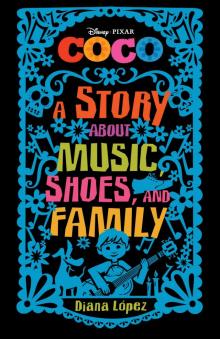 Coco Middle Grade Novel
Coco Middle Grade Novel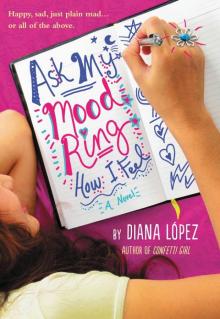 Ask My Mood Ring How I Feel
Ask My Mood Ring How I Feel Choke
Choke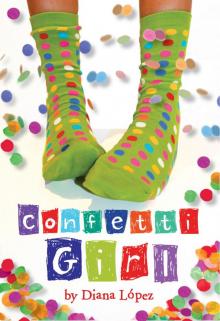 Confetti Girl
Confetti Girl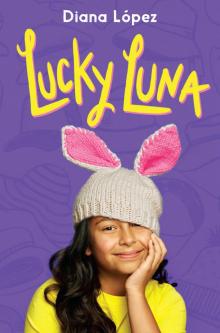 Lucky Luna
Lucky Luna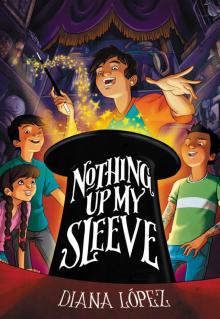 Nothing Up My Sleeve
Nothing Up My Sleeve